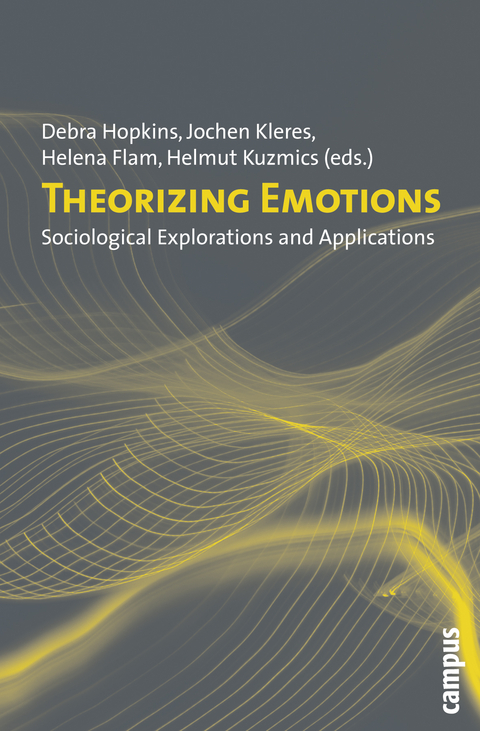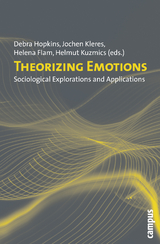Theorizing Emotions
Debra Hopkins forscht an der Universität Aberdeen. Helena Flam ist Professorin für Soziologie an der Universität Leipzig, wo Jochen Kleres derzeit promoviert. Helmut Kuzmics ist Professor für Soziologie in Graz.
Contents
Preface: Notes on the Sociology of Emotions in Europe
Jochen Kleres 7
Introduction: An Emotions Lens on the World
Arlie Russell Hochschild 29
Consciousness, Emotions, and Science
Jack Barbalet 39
Extreme Feelings and Feelings at Extremes
Helena Flam 73
Sociology as Narrative: Examples of Sociological Language
in "Classic" Texts
Helmut Kuzmics 95
Hearts or Wombs? A Cultural Critique of Radical Feminist
Critiques of Love
Eva Illouz and Eitan Wilf 121
Mediatizing Traumas in the Risk Society: A Sociology
of Emotions Approach
Nicolas Demertzis 143
The Civilizing of Emotions: Formalization and
Informalization
Cas Wouters 169
What Makes us Modern(s)? The Place of Emotions
in Contemporary Society
Patrick Becker 195
Shame and Conformity: The Deference-Emotion System
Thomas J. Scheff 221
The "Neurosociology" of Emotion? Progress, Problems
and Prospects
Simon J. Williams 245
Refugee Solidarity: Between National Shame and Global
Outrage
James Goodman 269
Just Being There: Buddies and the Emotionality of
Volunteerism
Jochen Kleres 291
Mediated Parasocial Emotions and Community: How
Media May Strengthen or Weaken Social Communities
Katrin Döveling 315
Notes on Contributors 339
Extreme Feelings and Feelings at Extremes
Helena Flam
The general aim of this chapter is to show that selected pre- and post-war classics of sociology interwove their discussions of the question of order with references to emotions. In fact they never left emotions out of their theorizing about social order. More specifically, I will demonstrate that some theorists believed that the social and political order constitutes an effective barrier to lurking, upsetting emotions, or even to life-and-limb threatening instincts and affects. Other theorists posited individuals as being both aware and wary of the painful emotions that threaten to surface when orderly interactions become upset. These theorists suggested that in order to prevent this from happening, individuals as social actors are willing to cooperate in sustaining social norms and conventional patterns of interactions. Taken together they surprise by their shared view that the social order and successful social interactions block negative emotions. More or less explicit in their writings is the idea that if we-as individuals and as social collectives-do not co-operate in sustaining political and social (interactive) order, we make each other and ourselves unhappy. Only a tiny minority among classical sociologists saw emotions as constitutive of the individual and the social order. They argued that emotions do "good works"-they help individuals to develop "social" selves that co-operate in creating and sustaining a "good" society. Also in contrast to those who saw social order as blocking negative emotions, more recently several theorists have argued that (the hierarchical) social order cannot but produce negative emotional outcomes. In all these ways, this text thus shows that the question of order has been, and remains, also about emotions.
Extreme Feelings at the Extremes - Unruly Times and Territories, System Breakdown, Disintegration
Let me start with a couple of rather well known, and therefore briefly presented examples. In Max Weber's reflections on charisma and in particular on the prophets, we find the first association between the breakdown of a social order and negative emotions (Flam 2002, 57-9). He proposed that when the law and rules break down and people find themselves in the situation of distress, they turn very emotional-desperate in fact, which makes them susceptible to various contenders for charismatic power. These, be it prophets, saviors, knights or political leaders, are all extremely emotional. Weber was impressed by the furious anger of prophets, and not only by their rationalizing reforms (Barbalet 2000), such as introducing taxes or bureaucracy. The feeling and thinking of the charismatic leaders transcends the realm of routine and everyday rules. Nothing short of intense love and devotion binds the followers to the charismatic leaders. The masses bow out of deference and admiration before their wisdom and fury. However, the leaders aspiring and wishing to consolidate their charismatic rule have repeatedly to prove themselves to their followers and to the masses. Should they fail, the deference and admiration of the masses turns into hate-the leaders risk being chased away. Since the breakdown is unique, it generates exceedingly strongly felt emotions: despair, love, admiration and hate. Very similar to that of Weber's, is Hannah Arendt's main thesis in The Origins of Totalitarianism (1973). In it she argues that a system breakdown frees the feelings of masses, turning them both desperate and "millennial," making it possible for the new-totalitarian-leaders to harness them to their goals. Writing about concrete historical cases, Arendt is specific about the elements of the breakdown. She refers to the failure of democratic institutions (political parties, parliament) and the Church to provide economic stability and orientation, in addition to the disintegration of the social classes that cease to be capable of capturing and regulating th
| Erscheint lt. Verlag | 14.9.2009 |
|---|---|
| Co-Autor | Jack Barbalet, Patrick Becker, Nicolas Demertzis, Katrin Döveling, Helena Flam, James Goodman, Arlie Russell Hochschild, Eva Illouz, Jochen Kleres, Helmut Kuzmics, Beatriz Munoz, Thomas J. Scheff, Eitan Wilf, Simon J. Williams, Cas Wouters |
| Zusatzinfo | 2 Figures |
| Verlagsort | Frankfurt |
| Sprache | englisch |
| Maße | 140 x 213 mm |
| Gewicht | 465 g |
| Themenwelt | Sozialwissenschaften ► Soziologie ► Allgemeines / Lexika |
| Sozialwissenschaften ► Soziologie ► Allgemeine Soziologie | |
| Schlagworte | Emotion • Emotion / Gefühl • Emotionssoziologie • Hardcover, Softcover / Soziologie/Soziologische Theorien • Rationalismus |
| ISBN-10 | 3-593-38972-X / 359338972X |
| ISBN-13 | 978-3-593-38972-1 / 9783593389721 |
| Zustand | Neuware |
| Haben Sie eine Frage zum Produkt? |
aus dem Bereich




